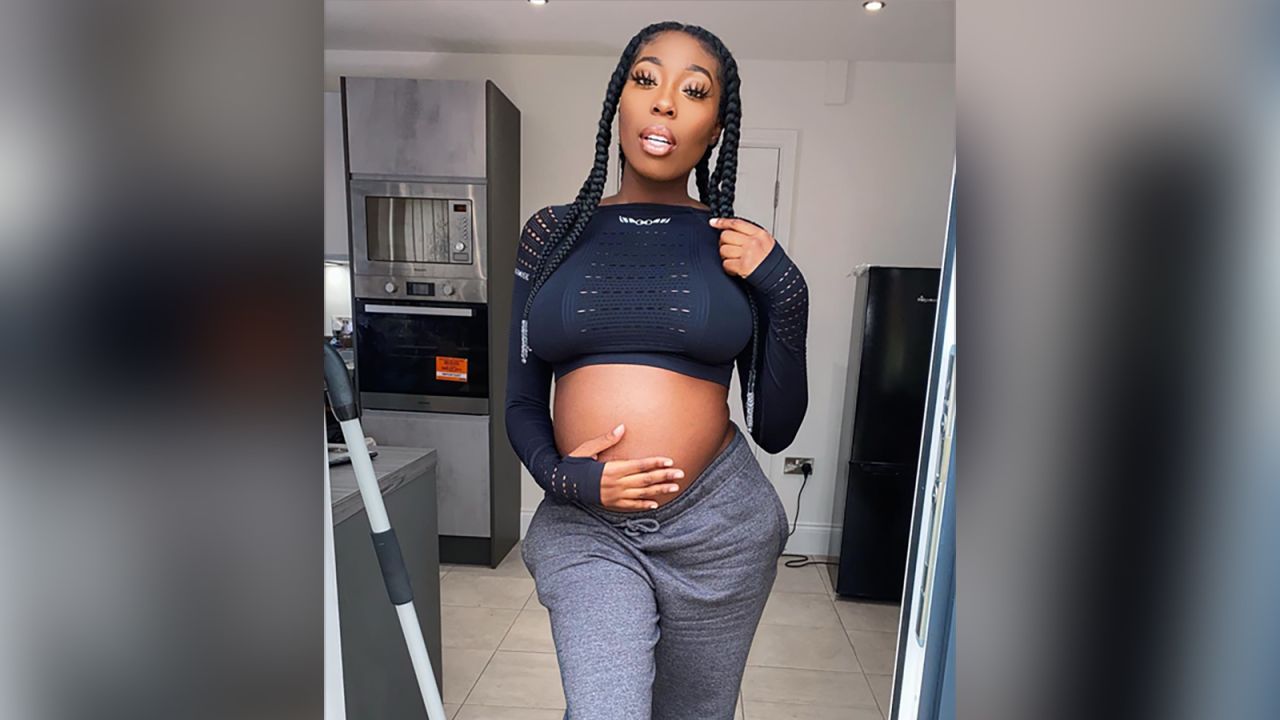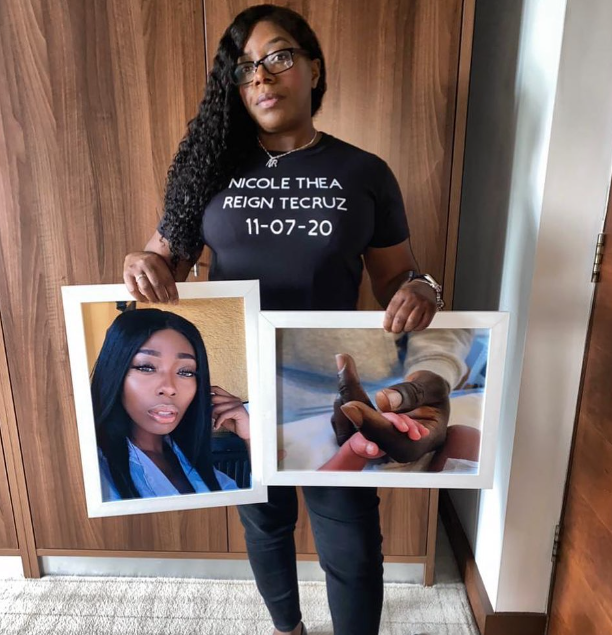Nicole Thea: Pregnant YouTube star died after ambulance delay as family say health concerns ‘ignored’
Exclusive: Family call for health authorities to be held accountable after influencer and her son’s death
Your support helps us to tell the story
From reproductive rights to climate change to Big Tech, The Independent is on the ground when the story is developing. Whether it's investigating the financials of Elon Musk's pro-Trump PAC or producing our latest documentary, 'The A Word', which shines a light on the American women fighting for reproductive rights, we know how important it is to parse out the facts from the messaging.
At such a critical moment in US history, we need reporters on the ground. Your donation allows us to keep sending journalists to speak to both sides of the story.
The Independent is trusted by Americans across the entire political spectrum. And unlike many other quality news outlets, we choose not to lock Americans out of our reporting and analysis with paywalls. We believe quality journalism should be available to everyone, paid for by those who can afford it.
Your support makes all the difference.The family of a YouTube star who died due to pregnancy complications claim race played a part in her health concerns being ignored.
Nicole Thea was eight months pregnant when she collapsed at her home in Doncaster in July 2020 and later died, with doctors also unable to save her unborn son, Reign.
The inquest found that the pregnant influencer, who had more than 100,000 followers on Instagram and YouTube, died of a cardiac arrest caused by an undiagnosed heart condition: hypertrophic cardiomyopathy – a condition Nicole’s paternal grandmother died from in 1986.

The family has also criticised the ambulance service’s delayed response.
The coroner, along with a pathologist, concluded at the inquest on 9 November that: “Although there was a delay with the first ambulance arriving, due to the sudden and unexpected nature of the collapse, Nicole being in the late stages of pregnancy and her underlying undiagnosed cardiac condition at that time, it is unlikely, that earlier attendance by the ambulance would have altered the outcome.”
But Nicole’s family dispute the conclusion of the inquest and have called for both the ambulance service and the maternity unit involved to be held accountable.
Yorkshire Ambulance Service conceded that the 999 call handler, although supervised, was a trainee.
The service added in its statement that: “The coroner acknowledged the very distressing 999 call made to Yorkshire Ambulance Service and the difficulty this caused in managing information about the patient.”
Speaking to The Independent, Nicole’s mother Samantha Antoine said she has been living in a “daily nightmare” since her daughter and grandson’s death and believed racial discrimination played a part in Nicole’s health concerns, including shortness of breath, being ignored.

Before she died Nicole described telling NHS staff about experiencing shortness of breath and feeling like her baby was “eating her from the inside out”. She claimed she was told it was not an issue and it’s normal to feel tired during pregnancy.
Nicole said at the time: “The worst thing about my pregnancy is that I'm always out of breath.
“I could walk from here to the end of the room and feel like I’m dying,” she continued.
Ms Antoine told The Independent: “They didn’t take Nicole seriously. They had a duty of care to Nicole. And I don't feel that that duty of care was adequate at all.”
Her death sparked outrage and propelled the conversation around poor maternity outcomes for Black and ethnic minority women which sees them five to six times more likely to die in childbirth, according to a report from MBRRACE-UK.
Doncaster and Bassetlaw Teaching Hospitals NHS Foundation Trust said issues of shortness of breath were not in Nicole’s medical notes.
Ms Antoine said if Nicole was a white woman she would have been taken seriously.
“The maternity stats don’t lie,” Ms Antoine said. “The fact Nicole passed away shows she wasn’t taken seriously.

“I mean, what more does she have to say? If it was anyone else, someone white, they would have believed her and they would have referred her.”
On the night she died, the 24-year-old collapsed and her breathing began to deteriorate, her partner Jeffrey Frimpong, known as Global Boga, told The Independent. He said he failed to get through to the ambulance on his first attempt before finally eventually receiving help after a subsequent call.
The 999 operator who received Mr Frimpong’s call was a trainee who the family say failed to grasp the severity of the situation.
Despite doctors’ efforts, Nicole died and her baby Reign passed away about seven hours after his mother.
“When she passed away I was still three hours away,” Ms Antoine said. “I heard that Nicole died when I was on the motorway.”
“We were devastated that we lost both of them. We took Reign down to where Nicole was in the emergency room and put Reign in her arms where he died in her arms.
“And you just can’t imagine this image that I’ve got constantly I try not to think about it, of Nicole just there on the hospital bed with things in her mouth and Reign.”

The coroner and pathologists at Nicole’s inquest determined that it was “unlikely” that the ambulance's delay would have altered her chances of survival due to the stage of her pregnancy and the underlying condition.
Professor Aneil Malhotra, consultant cardiologist and expert in supporting people with heart conditions, told The Independent that although he cannot comment specifically on Nicole’s case, he emphasised the importance of the earliest possible emergency intervention following cardiac arrest.
He said that concerns about shortness of breath should never be ignored in patients, even in pregnancy where it can be difficult to distinguish whether the issue is linked to childbearing or another underlying condition.
He added that in cases of Black people, where cardiovascular diseases are more common, concerns should be even greater attention.
“There are lots of diseases that can happen among pregnant women such as underlying heart conditions being revealed, clots in the legs and lungs,” Professor Malhotra said.
“No one should ignore any symptom and you shouldn’t just attribute it to pregnancy-related symptoms until serious conditions have been ruled out.
He continued: “We know that there are some groups who are more predisposed to cardiovascular disease, heart disease and strokes.
“That includes Black, Afro Caribbean groups and these people are underrepresented in research and that’s a fact.”
He called for awareness to be increased about such heart conditions and called for greater care to be taken in maternity care for pregnant women who display symptoms.
Ms Antoine also lamented failings by the NHS in 1986 after the death of Nicole’s grandmother – who died of the same heart condition. She questioned why testing and information of the condition was not offered to Nicole’s father and his siblings to ensure the family knew of the presence of the genetic condition in their lineage.

Nicole’s family and friends are now calling for Yorkshire Ambulance Service to be held accountable.
“I wouldn't be able to sleep at night if I don't get justice for Nicole and Reign,” Ms Antoine said.
“No other family should go through this, especially the failings of Yorkshire Ambulance Service.”
Nicole’s mother said she wants everyone to know what happened to her daughter in a bid to raise awareness of maternity outcomes for Black women and ensure the same mistakes are not repeated.
“These people who had a duty of care to look after Nicole didn’t do a good job,” Ms Antoine said. “And they’re still working, they can go home to their families every single day. They can go home at Christmas now and have a good time but I won’t.”
Five X More a campaign group to improve maternity outcomes for Black women said Nicole’s case was “devastating” and would leave many fearful and anxious about pregnancy.
“We worked on a report and one of the things that came out was looking at a pregnant person as an individual,” co-founders Clotilde Abe and Atinuke Awe told The Independent.
“Black women will be scared to hear this. Imagine being a Black pregnant woman hearing you went into hospital to complain and nothing happened or I went to hospital to give birth and my child died and I died.”
“In our Black Maternity experience report released in May, a lot of the quotes said Black women felt like they weren’t being listened to and were being discriminated on race.”
Five X More leads an all-party parliamentary group lobbying to improve outcomes for Black women in maternity and health care calling for the government to improve data collected for Black women and create targets to be met.
Although maternity mortality rates in the UK are some of the lowest in the world, the pair stressed, “there is a disparity in who is dying.”
When asked Doncaster and Bassetlaw Teaching Hospitals NHS Trust did not directly respond to claims that race played a part in Nicole’s treatment.
Dr Tim Noble, executive medical director at Doncaster and Bassetlaw Teaching Hospitals, said: “First of all I would like to extend my deepest sympathies and condolences with the friends, family and loved ones of Miss Thea.
“Miss Thea's passing, and that of her son, was unexpected and, as was recently confirmed by His Majesty’s Coroner following inquest, unavoidable despite the very best efforts of healthcare professionals at Doncaster Royal Infirmary.”
A spokesperson for Yorkshire Ambulance Service NHS Trust added: “First and foremost, our thoughts remain with the family of Nicole and her son Reign following their deaths in July 2020 and we extend our sincere condolences to them.
“The coroner acknowledged the unprecedented strain of Covid-19 on the ambulance service at the time of the incident and was satisfied that the Trust now has a more robust system in place in relation to call handling, training and mentoring, and has increased the number of clinical staff in the Emergency Operations Centre, to support complex decision making.”
If you have been impacted by this story, you can visit Five X More for details on support for mothers in maternity.




Join our commenting forum
Join thought-provoking conversations, follow other Independent readers and see their replies
Comments